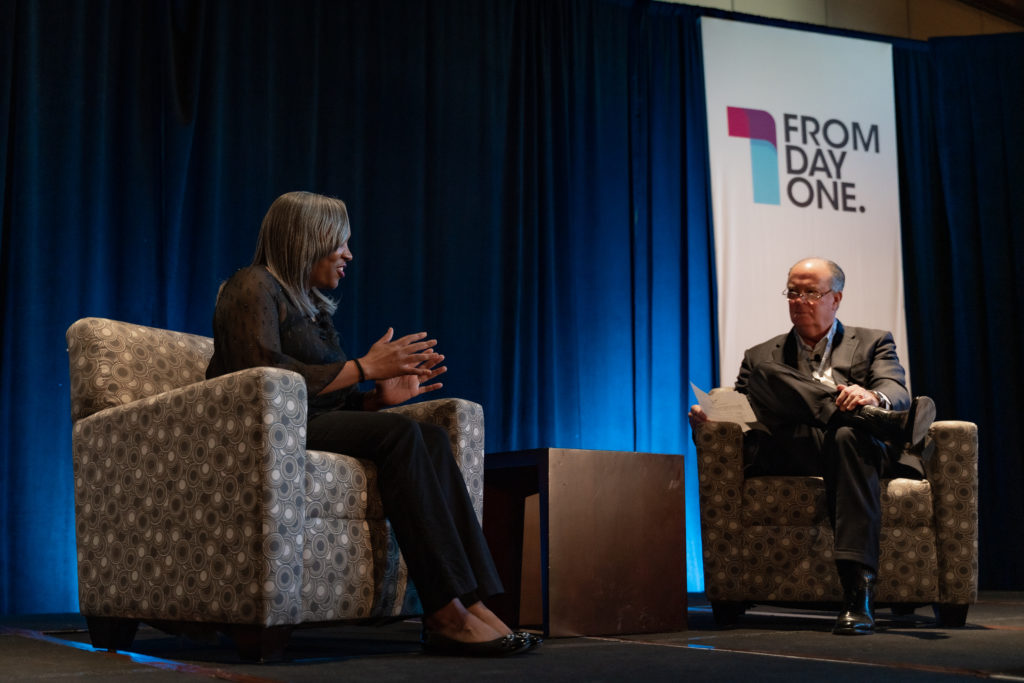Creating a Culture of Belonging in a Tech-Based Workplace


“We have to continue to move forward, and at Dell, we think about work as an outcome. It’s not a particular time or place anymore,” said Vanice Hayes, Dell’s chief of culture, diversity and inclusion, referring to the typical 9-to-5. “So it’s important for leaders to think differently about how work gets done, and be supportive, and make sure they're flexible.”
Hayes provided insight into the secrets of being purposeful in a remote, ever-changing workplace alongside moderator Dan Goodgame, editor-in-chief of Texas Monthly. As the world continues to play catch up, intentionality and sense of belonging has become more important than ever.
Goodgame and Hayes discussed “Creating a Culture of Belonging in a Tech-Based Workplace,” a fireside chat during From Day One’s Austin conference, touching on ways to foster inclusion without losing productivity. Hayes, former math teacher in San Marcos, is armed with the idea that leaders should meet their peers and employees where they are–a sentiment she has taken from the classroom.
As more and more companies move into a more hybrid-friendly space, the idea of intentionality paired with the new waves of flexibility has opened doors for those underrepresented and unheard. Hayes shared the story of a recent new hire who had the chance to go virtually anywhere, but chose Dell due to the fluidity of remote work that ultimately eliminates relocation worries. Furthermore, the decision to be more open to remote work sets an important precedent in diversity, equity, and inclusion (DEI) efforts.
“Enabling that choice is really, really important not only to people of color, but we’re finding it’s true for our team members that are part of the LGBTQIA+ community or team members with disabilities,” Hayes said. “Being hybrid has really helped us to attract people that we might not have ever been able to meet before.”

Creating the space for organic interruptions, virtual check-ins, and collaboration is how Hayes suggests keeping up with the company culture in a more tech-forward environment. Asking crucial questions such as ‘How are you doing?’ and ‘How can I help?’ opens the flow of communication between all ranks of employees, and can be the difference between a positive or negative experience.
“Now that we all are equal squares on a page, you’re starting to hear more and more from these folks that may have historically been quiet,” Hayes said. “Now, they’re speaking up and kind of sharing ideas and best practices on how to get work done.”
A common misconception Goodgame identified is most managers and leaders believe productivity must have dropped due to leniency in location. However, Hayes said that there has been no meaningful difference and instead, the hours of work have shifted.
In an effort to further diversify their roster, Hayes shared that Dell’s 2030 goals have had a great start as about 34% of its workforce and 28% of global leaders identify as female, and roughly 15% of U.S. employees hail from underrepresented groups. A major contributing factor to “casting a wider net” has been consolidating energy at the source–young people in school.
“We have a program called the Student TechCrew with a local high school here where we train students to be the tech support for their schools,” she said. “It’s huge because we’re getting them interested in STEM, we’re getting them that hands-on experience, and while they may never end up working at Dell, we’re doing what we can to contribute to building those skills and getting people interested.”
Goodgame added that for Texas Monthly, opening hybrid positions was the difference between 30 people applying versus roughly 300.
At the end of the conversation, Hayes instilled the idea that inclusion has become more widely found at companies like Google because of the hybrid model allowing access to a whole new set of benefits, including constant innovative advances. Barriers that often halt other talented individuals have disappeared and have opened a world of opportunities for corporate America.
Lauren Castro is the social media editor at Texas Monthly, whose writing has appeared in other publications including Flaunt Magazine and Alcalde. She has a bachelor’s degree in journalism from the University of Texas at Austin.
The From Day One Newsletter is a monthly roundup of articles, features, and editorials on innovative ways for companies to forge stronger relationships with their employees, customers, and communities.